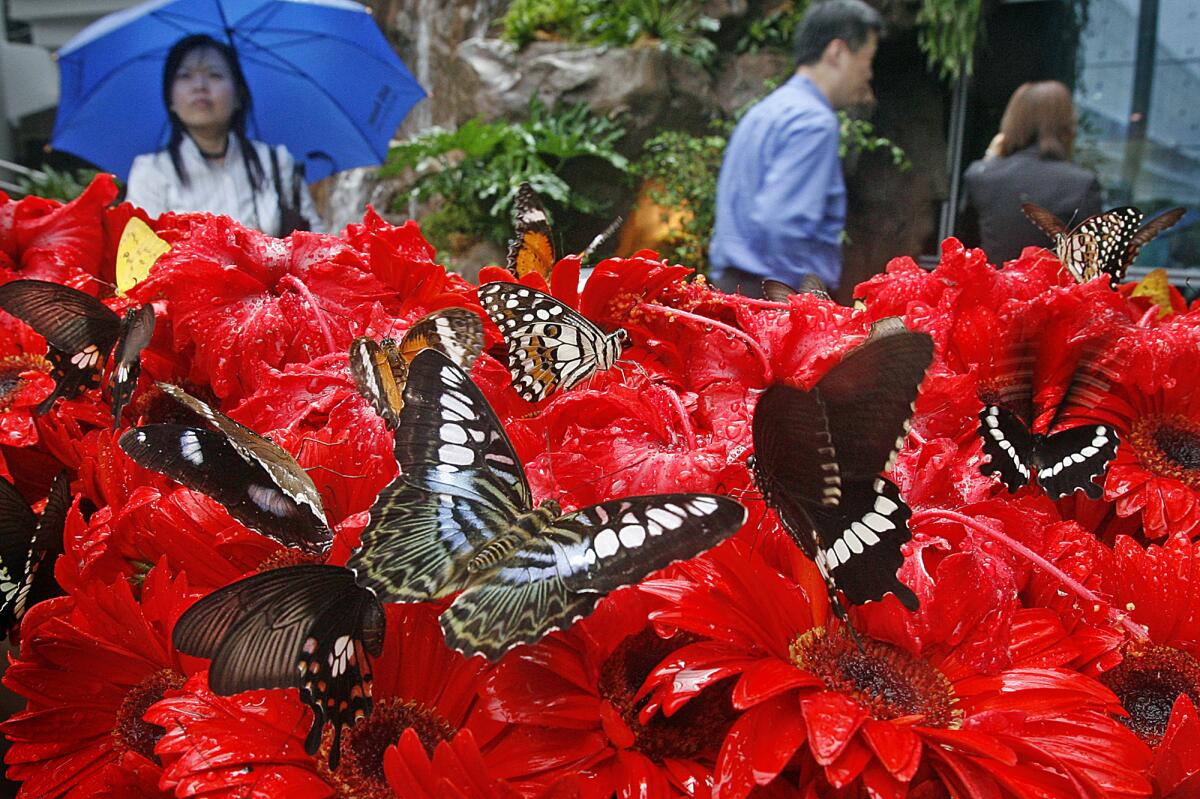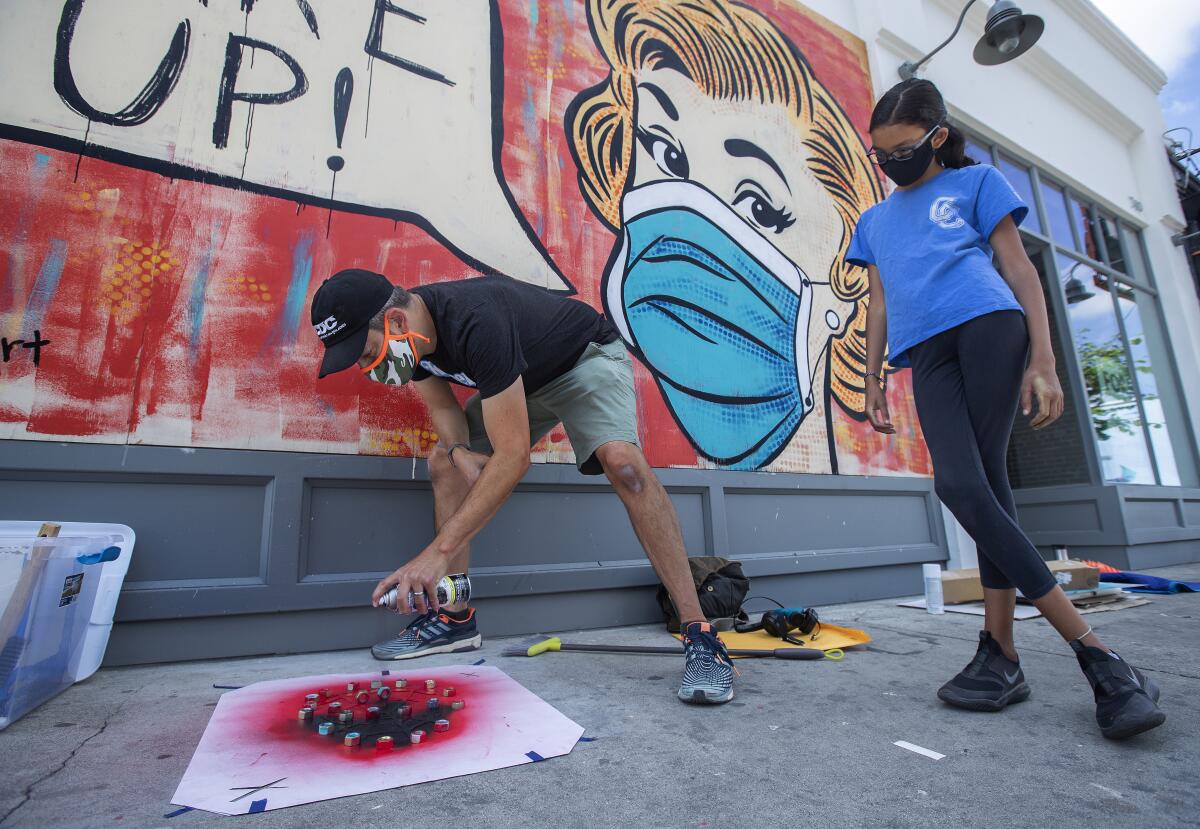Coronavirus Today: Hopeful signs amid the surge
Good evening. We’re Diya Chacko and Sam Schulz, and it’s Friday, July 10. Here’s the latest on what’s happening with the coronavirus, plus ways to spend your weekend and a look at some of the week’s best stories.
California’s recent surge in coronavirus cases is now prompting a rise in COVID-19 deaths. The question now is how big the wave will get before it crests, and what happens in schools, hospitals and prisons could play a significant role.
Half the state’s 58 counties are on the coronavirus watchlist as infections, hospitalizations and deaths near unprecedented levels. Los Angeles County added 1,750 new cases Thursday alone, pushing its cumulative count above 125,000. Yet there are also signs of hope for L.A. County: Even as hospitalizations reached all-time highs this week, they’ve been rising at a slower rate in recent days, said Dr. Christine Ghaly, the county’s director of health services.
As many as 8,000 people could be released from California prisons early in an unprecedented attempt to stop COVID-19 outbreaks apparently fueled by the transfers of people incarcerated at different facilities, top advisors to Gov. Gavin Newsom said Friday. More than half of them could be let out by the end of this month. Nearly 2,400 prisoners around the state have tested positive, including 1,399 in San Quentin. For more on how the San Quentin outbreak exploded and the story of a Palmdale woman whose husband tested positive, read yesterday’s Essential California newsletter.
And weeks before the start of the new school year, Californians remain anxious and deeply split over whether schools can safely reopen. A new statewide poll suggests parents are grappling with the prospect of stressful, less effective learning at home — not to mention continued child care woes — as well as fears that kids could bring COVID-19 home. “I do think she needs to go back at least some of the time,” said one L.A. woman of her 8-year-old granddaughter. “But I’m so afraid because I don’t know what’s going to be in place.”
Beyond California, new research is helping to shape our understanding of how the coronavirus is transmitted — and for whom COVID-19 poses the gravest danger.
Facing growing pressure from researchers, the World Health Organization has now acknowledged that the virus can linger in the air indoors and potentially infect people even when they practice social distancing, after earlier maintaining that such airborne transmission occurred only during certain medical procedures. In revised guidelines issued Thursday, the UN health agency granted that such transmission was a possibility in outbreaks such as one that sickened dozens of choir members in Washington state, and it recommended avoiding enclosed spaces with poor ventilation as well as crowded places.
Research has repeatedly shown that Black and Latino people are more likely to die of COVID-19 than white people, and in L.A. County, new data show Latinos are twice as likely as whites to get the virus. A new report from the Centers for Disease Control and Prevention also reveals another racial disparity: Black and Latino people also die younger. In a study of more than 10,000 Americans who died, the typical white victim was 10 years older than the typical Latino victim and nine years older than the typical nonwhite, non-Latino victim — a category dominated by Black Americans. The findings point to troubling patterns that health authorities must address, the CDC researchers say.
So as the outbreak rages nationwide, what can be done until there’s a vaccine? A number of experts are pushing to inoculate people with an injection of antibodies from the blood plasma of COVID-19 survivors — potentially protecting millions of lives, according to the two scientists behind the proposal and the leading specialists who support it.
For now, the idea exists only on paper. Federal officials have rejected requests to discuss the proposal, and pharmaceutical companies have declined to invest the money needed to design or manufacture the shots, according to a Times investigation. There is little disagreement that the idea holds promise, but federal officials and industry groups say such therapies should focus on treating sick people, not preventing infections.
By the numbers
California cases and deaths as of 5:13 p.m. PDT Friday:

Track the latest numbers and how they break down in California with our graphics.
What to read this weekend
These 10 Californians are finding creative ways to get by and set up a brighter future, whenever it arrives. We tell their stories, including those of a seamstress who switched from festival-hopping to mask-selling, an out-of-work event planner who started a community garden to feed people in need and an advertising executive who’s all in on his VR invention.
The pandemic may be making better bosses who talk less and listen more. Inquiring after employees’ well-being and understanding their unique challenges have always been part of good management strategy, experts say — but before the pandemic, it may have been easier to gloss over. As one manager put it: “I’m learning to manage that whole person, not just the performer.”
“It trickles down.” The pandemic has shocked this Texas town’s oil-based boom-or-bust economy. Unemployed oil and gas workers, even those used to lean times, are having trouble making ends meet, leaving residents more worried about the economy than the virus.

Only one California county remains coronavirus-free. Masks are still optional in rural Modoc County, which has pushed back against Gov. Gavin Newsom’s restrictions on businesses. So far, the county’s main hospital is empty, no one has come down with COVID-19, and residents say they’re waiting for a pandemic that has yet to arrive.
Drive-ins and “virtual cinemas” have become indie films’ lifeline. Even as movie studios left an unprecedented gap in the release calendar, a few daring indie distributors stuck around to take a chance with any screens available. That included returning to old outlets such as drive-ins and experimenting with new ones such as partnerships with virtual platforms.
An airport built to awe in Singapore is quieted by COVID-19. With its butterfly and orchid gardens, custom-made fragrance and glass-domed mall housing, the visitor experience at Changi Airport is considered the gold standard of international airports. Now that the pandemic has reduced the flow of passengers to a trickle, it and other airports in Asia have pivoted to serve as the first lines of defense against the spread of COVID-19.

Wanted: Young people willing to get COVID-19. As the race for a vaccine continues, around 30,000 people globally have volunteered to participate in a controversial type of medical study known as a human challenge trial, or HCT. Such a study might help reduce the wait time for a vaccine — if it gains federal approval.
Reinventing the voter registration drive. The pandemic tore apart carefully laid plans for door-to-door voter registration drives. Democrats and Republicans alike are struggling, but the stakes are particularly high for the left, which is counting on mobilizing people who often don’t vote to help oust President Trump.
“I think I might have inadvertently caused this to happen.” At a resident’s request, the manager of a Canoga Park apartment building posted a sign in the elevator reminding riders to wear masks. Then swastikas and racial slurs appeared on the elevator walls.
Your support helps us deliver the news that matters most.
What to do this weekend
Cool off. L.A. County just opened 14 free splash pads to help families cool off, and a few public pools in the region are open, too. If something edible is more your speed, visit the California Botanic Garden — the state’s largest garden of California native plants, previously known as Rancho Santa Ana Botanic Garden — and taste one of three flavors of ice cream made using native plants found there.
Get outdoors. Yes, you can still go whale-watching in Southern California. (If you venture inland to Joshua Tree National Park, however, steer clear of one campground full of angry bees.) Eager to hit a trail? Here’s the latest on what’s open and what’s closed from Christopher Reynolds and Mary Forgione. You can sign up for her newsletter the Wild for more.
Eat food that doesn’t require a fork. If you’re up for cooking, try Genevieve Ko’s vegan empanadas or columnist Ben Mims’ black bean and mushroom burgers, and subscribe to their newsletter for more delicious recipes that make the most of peak summer veggies. For the lazy, or those who want to patronize a Pasadena institution, there is always Roma Market, whose 81-year-old owner Rosario Mazzeo is still selling his famous Italian sandwiches.
Watch something great. Consult our long list of virtual culture to keep you occupied — streaming concerts, online musicals, virtual art exhibitions and more. Or watch an indie film; Mark Olsen rounds up a few worth watching, from a new rom-com to a celebrated frontier film to a documentary about a beloved TV astrologer, in his Indie Focus newsletter.
Listen to a podcast. Try “Coronavirus in California” for dispatches from the front lines. For stories from beyond the crisis, check out our podcast “It Was Simple: The Betty Broderick Murders,” written and hosted by columnist Patt Morrison. Here are more great podcasts, too.
Resources
— For general safety, wash your hands for at least 20 seconds (here’s a super-fun how-to video). Stop touching your face, and keep your phone clean. Practice social distancing, maintaining a six-foot radius of personal space in public. And wear a mask if you leave home. Here’s how to do it right.
— Watch for symptoms including fever, cough, shortness of breath, chills, repeated shaking with chills, muscle pain, headache, sore throat and loss of taste or smell. If you’re worried you might be infected, call your doctor or urgent care clinic before going there.
— Need a COVID-19 test? Here’s how to receive a free test if you’re in L.A. County. And here’s a map of testing sites across California.
— Here’s how to care for someone with COVID-19, from monitoring their symptoms to preventing the virus’ spread.
— If your job has been affected by the pandemic, here’s how to file for unemployment.
— Here are some free resources for restaurant workers and entertainment industry professionals having trouble making ends meet.
— Advice for helping kids navigate pandemic life includes being honest about uncertainties, acknowledging their feelings and sticking to a routine. Here’s guidance from the CDC.
— In need of mental health services? Here are resources for coping during the crisis from the CDC and the L.A. County Department of Public Health. L.A. County residents can also call (800) 854-7771 or text “LA” to 741741.
— Tempted to go out now that the economy is reopening? Here’s how you can assess your risk.A pandemic in pictures

Neal Brandenburg spray-paints a homemade stencil with his daughter Ruby, 11. The Culver City family has been creating spray-chalk drawings of superheroes on sidewalks, along with the message “Heroes Wear Masks.” The chalk artwork, Neal said, has become a public service announcement for his daughters and other kids in the neighborhood.
Got a question? Our reporters covering the coronavirus outbreak want to hear from you. Email us your questions, and we’ll do our best to answer them. You can find more answers in our Frequently Asked Questions roundup and in our reopening tracker.
For the most up-to-date coronavirus coverage from The Times over the weekend, visit our homepage and our Health section, listen to our “Coronavirus in California” podcast, sign up for our breaking news alerts, and follow us on Twitter and on Instagram.





